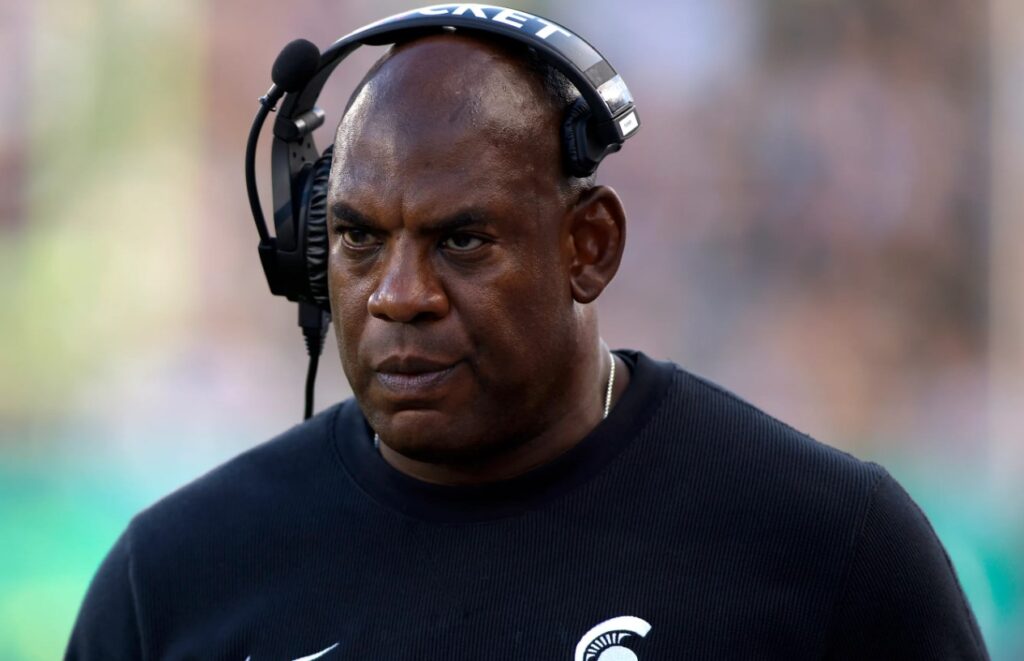Michigan State University officials, including interim President Teresa Woodruff and the board of trustees, chose not to seek details of an ongoing sexual harassment investigation against football coach Mel Tucker, a spokeswoman said Tuesday. The decision raised questions about the university’s transparency and accountability in handling such cases.
Tucker suspended without pay
Tucker was suspended without pay on Sunday after USA Today reported that he was accused of sexually harassing a former MSU student and athlete, Brenda Tracy, in 2014. Tracy alleged that Tucker, who was then an assistant coach at Ohio State University, made unwanted advances and touched her inappropriately during a visit to MSU. Tracy said she reported the incident to MSU officials in December 2020, but did not hear back from them until July 2021, when she was informed that the investigation was completed and Tucker was cleared of any wrongdoing.

Tracy said she was shocked and disappointed by the outcome, and felt that the investigation was biased and flawed. She said she was not interviewed by the investigator, nor was she given a copy of the report. She also said she had evidence to support her claim, such as text messages and photos, but they were not considered by the investigator.
Tracy said she decided to go public with her story after learning that Tucker had signed a 10-year contract extension worth $95 million with MSU in February 2021. She said she felt betrayed by the university and wanted to hold Tucker accountable for his actions.
MSU leaders unaware of specifics
According to MSU spokeswoman Emily Guerrant, Woodruff and the board were notified in December 2020 that a complaint had been made against Tucker, but no specific details were given, as part of university protocols and best practices for Title IX and Relationship Violence and Sexual Misconduct-related cases. Woodruff said she later became aware of Tracy’s identity in July 2021 after a third-party investigator hired by the university completed a report on the matter.
However, Guerrant said that Woodruff and the board did not seek more details about the complaint against Tucker while the investigation was underway. She said the university’s goal was to ensure a fair and thorough investigation, and having the president or the board involved during the investigation would not be appropriate. “There should be no pressure or influence on the process as it plays out,” Guerrant said.
Guerrant also said that Woodruff and the board did not know the specific allegations made against Tucker until they read the USA Today article on Sunday. She said they were surprised and concerned by the report, and decided to suspend Tucker pending further review.
Experts question MSU’s approach
Some experts have questioned MSU’s approach to handling Tucker’s case, saying that it lacked transparency and accountability. They said that while privacy safeguards are a key part of Title IX regulations for both accusers and the accused, there is no prohibition against school leaders knowing the status of an ongoing investigation, especially in a high-profile case like Tucker’s.
Deborah Gordon, a Title IX expert and discrimination attorney in Bloomfield Hills, said that MSU’s regulations allow the university to internally discuss what it knows about a complaint, including the identity of the accuser and the respondent. “This means they cannot go public with the names. That does not mean they cannot within their own university reveal the names, such as calling each other and sharing information on the phone, or sending an email to AD or the president. You need to know about this,” Gordon said.
Scott Schneider, a Title IX attorney who has handled cases for private and public universities around the country, said that it would be appropriate for Woodruff to inquire about a case like Tucker’s, given his prominence and influence on campus. He said that Woodruff could have asked for updates on the progress of the investigation, or requested a summary of the findings before they were finalized. He also said that Woodruff could have consulted with legal counsel or outside experts to ensure that the investigation was conducted properly and fairly.
Schneider said that by choosing not to seek details of Tucker’s case, MSU leaders may have missed an opportunity to demonstrate their commitment to addressing sexual harassment and misconduct on campus. He said that this could undermine their credibility and trust among students, faculty, staff, alumni, donors, and fans.
